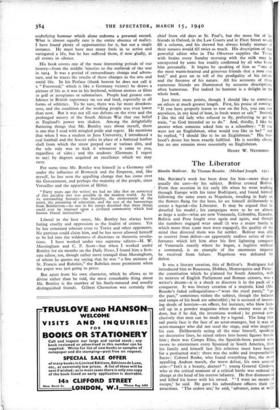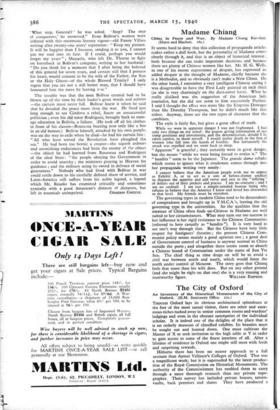The Liberator
Simon Bolivar. By Thomas Rourke. (Michael Joseph. 15s.) MR. ROURICE'S work has been done for him—more than is usually the case—by his subject. Bolivar created Bolivar.
• From that occasion in his early life when he went walking through Europe with his tutor Rodriguez, and found himself following the same route as Napoleon, treading in Italy on the flowers flung for the hero, he set himself deliberately to create a legend—the Liberator. It may be argued that he dwarfed his model ; his campaigns were to be on almost as large a scale—what are now Venezuela, Colombia, Ecuador, Bolivia and. Peru fought over again and again, and though the numbers engaged were small (it was a major battle in which more than 2,000 men were engaged), the quality of the mind that directed them was far nobler. Bolivar was able to recover from defeat—an apparently endless series of mis- fortunes which left him after his first lightning conquest of Venezuela exactly where he began, a fugitive without a command, is an example of the enormous impetus he received from failure. Napoleon was defeated by defeat.
It was a literary creation, this of Bolivar's. Rodriguez had introduced him to Rousseau, Hobbes, Montesquieu and Paine: the constitution which he planned for South America, with its mixture of English Parliament and Roman censors, was a writer's dream—it is a shock to discover it in the pack of a conqueror. It was literary creation of a majestic kind (Mr. Rourke's faded colloquialisms—" wore the royal pants," "go the pace," sometimes violate the subject, though the balance and tempo of his book are admirable) ; he is accused of invent- ing deeds of heroism—an officer, for instance, who blew him- self up in a powder magazine when the enemy were at the door, but if he did, the inventions worked ; he proved con- clusively that men can be made by- a legend. The long thin sad poetic face is the face of an actor-manager, but it was an actor-manager who did not steal the stage, and who inspired his cast. Deliberately acting all the time himself, speaking set decorative lines, he raised others into heroic figures beside him ; there was Campo Elias, the Spanish-born patriot who swore to exterminate every Spaniard in South America, then his family and himself last (his relatives must have hoped for a protracted war): there was the noble and irreproachable Sucre : Colonel Rooke, who found everything fine, the most appalling Andean march, the worst defeat, his own severed arm—" Isn't it a beauty, doctor? ": young General Cordova, who at the critical moment of a critical battle was ordered to charge at the head of his reserve infantry. He first dismounted and killed his horse with his sword. " I want no means of escape,' he said. He gave his subordinate officers their in- structions. ' The orders are,' he said, ' advance, arms at will:
' What step, General? ' he was asked. Step? The step
of conquerors,' he answered." Even Bolivar's women were inflated with this enormous literary vigour—old Fanny Villars writing after twenty-one years' separation: " Keep my picture. It will be happier than I because, sending it to you, I cannot put my soul into its face. If 1 could, perhaps you would forget my years " ; Manuela, who left Dr. Thorne to fight on horseback in Bolivar's company, writing to her husband: " Do you think for a moment that I after being the beloved of this general for seven years, and certain still that I possess his heart, would consent to be the wife of the Father, the Son or the Holy Ghost—of the whole Blessed Trinity? I only regret that you are not a still better man, that I should have honoured him the more by leaving v.)u."
The trouble was that the men Bolivar created had to be blown up all the time by their leader's great words and actions —the curtain must never fall. Bolivar knew it when he said that he dreaded the peace more than the war. He lived just long enough to see Cordova a rebel, Sucre an unsuccessful politician ; even his old tutor Rodriguez, brought back to man- age education in Bolivia, a failure. (He took off all his clothes in front of his classes—Rousseau buzzing now only like a bee in an old bonnet.) Bolivar himself, attacked by his own people, was on the way to exile when he died—he had his curtain line : " All who have served the Revolution have ploughed the sea." He had been too heroic a creator—the superb ardours and astonishing endurances had been the enemy of the object —the object he had learned from Rousseau and Rodriguez of the ideal State : " the people obeying the Government in order to avoid anarchy ; the ministers praying to Heaven for guidance ; and the military using its sword in defence of social guarantees." Nobody who had lived with Bolivar in war could settle down to his carefully defined share of service, and Latin-America still suffers from his noble legend, a legend which Mr. Rourke has examined critically and sometimes cynically with a good American's distrust of dictators, but























































 Previous page
Previous page